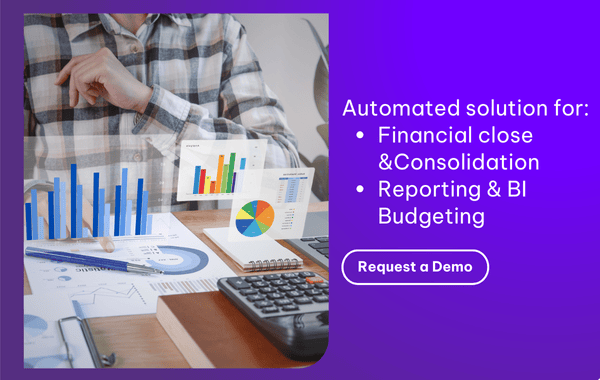Manual financial consolidation is time-consuming and labour intensive. Many companies find that manual processes are no longer sufficient and can lead to serious delays and inaccuracies in the year-end financial close process.
Overview
I. What factors to consider when choosing financial consolidation software?1. Agility and speed
2. Integration
3. Automation
4. Real-time data consolidation
5. Enhance reports and graphic
6. Industry functionality
II. Benefits of having financial consolidation softwareIII. Key features to look for when selecting financial consolidation software
Those who continue to use disparate spreadsheet-based financial consolidation processes, in particular, are experiencing more and more issues in trying to produce insightful financial reports and meeting intercompany accounting requirements.
On the contrary, those that leverage technology to automate financial consolidation processes have seen an increase in both accuracy and efficiency.
Read more: 7 Worst Financial Fiascos caused by Excel errors

What factors to consider when choosing financial consolidation software?
Financial consolidation software is a tool that can ease and speed up the process of financial reporting, budgeting, consolidating, forecasting, analysing large and complex data. Through financial consolidation software, you can automate repetitive, labour-intensive tasks and enhance the performance of your team.
There is plenty of financial consolidation software currently available on the market, but it is not an easy decision for CFOs and business owners to make.
Read more: 4 Deadly Sins of Financial Consolidation
Whether you are a CFO or a business owner, consider the following factors before selecting or purchasing financial consolidation software for your company.
1. Agility and speed
Choose software that will enable you to speed up and streamline financial consolidation processes. Your choice of software should also be agile and able to accommodate both the way that your organisation functions as well as the various international reporting standards, such as IFRS and GAAP, that you need to comply with.
2. Integration
Look for software that can allow simple integration with a performance management platform so that your company can grow to be more focused and agile as well.
If your business has several subsidiaries running multiple ERP systems, it is highly critical that your close and consolidation software are well integrated with all of them, and you can link all of your company’s financial results back to your original data sources, thus, providing a higher level of transparency in your reporting.
Read more: Hurdles to a fast, effective financial consolidation process
3. Automation
Most financial consolidation software today will provide various options for automation. Everything from preparing data to consolidating measures, converting currencies, or generating reports can be automated to reduce processing time and increase the overall accuracy.
It is important to find software that offers automation where your business needs it the most. The most effective financial consolidation software offers more than just automation but also functionality to control, check, and automatically run a range of different steps in the consolidations process. This will help to improve the overall efficiency of your consolidation process.
Read more: Improve Teamwork, Communication and more with Workflow Automation
4. Real-time data consolidation
Automation solutions can consolidate data in real-time, update and organise data as your team or stakeholders enter the system. With a real-time solution in place, data and resulting financial statements can be ready for review shortly after you have received all the required data.
5. Enhance reports and graphic
Make sure the financial consolidation software you choose contain robust analytics and strong data visualisation to enhance your reporting.
6. Industry functionality
An equally critical factor to pay attention to when selecting financial consolidation software is the unique industry requirements that businesses need to follow. Therefore, make sure the software that you choose can perform the tasks required according to your industry standards.
Other factors to consider are:
- The system must be secure with SSL, VPN, and/or dual-factor authentication, and the capability to limit data access by user, user type, and user group or role
- Mobile technology and collaborative cloud architecture
Benefits of having financial consolidation software
There are a lot of benefits if you are working with advanced financial consolidation software.
By investing in the right financial consolidation software, it will provide your company, especially the finance department, with a customised solution to automate all complex calculations and consolidation processes, such as:
- Connect data from all key finance processes
- Provide real-time data
- Improve analysis and reporting
- Reduce errors
- Tax provisioning, governance regulation and foreign exchange
- Automate financial planning, budgeting, forecasting, analysing, reporting, consolidation
Read more: Financial consolidation: Dealing with intercompany transactions
Key features to look for when selecting financial consolidation software
The right financial consolidation software delivers accuracy and efficiency to your finance function and your decisions making as a whole.
Key features you must consider when selecting financial consolidation software are:
- Currency conversion
- Intercompany eliminations of credit/debits and expenses/revenues
- Elimination of investment in subsidiaries of the company
- Cash flow calculating and reporting
- Creation and comparison of unlimited scenarios
- Management of multiple charts of accounts
- Multiple customisable closing periods
- Intercompany reconciliation at transaction document or currency level
- Flat and sub-consolidation models
- Unified consolidation and transactional activities
- Integration with other business software
- Scalable security futures to ensure the protection of all data
- Centralised environment for intercompany transaction processing
- Real-time consolidating reports
Having a single source of truth, accurate and timely insight for the finance and management teams, is paramount. For most midsize companies, this means having the right monitoring tools and reporting software in place to collect, consolidate, and report key financial and operational data that can assist companies in drive decisions.
By integrating your existing accounting and other transaction systems, you can eliminate the human errors that commonly occurred during the consolidations process.
A strong and innovative enterprise performance management (EPM) system can transform your finance department by giving you better financial results, better predictive modelling and an agile platform for your operational planning.
Need help with your current financial consolidation process? REQUEST AN INFOR D/EPM DEMO to see what we can offer to your business. Click here to learn more.
 English
English  Vietnamese
Vietnamese 


